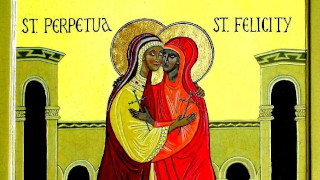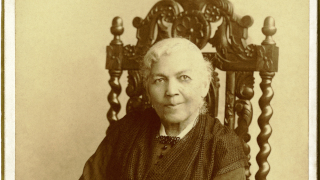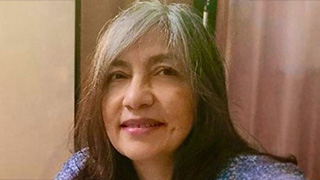Inside the Core: Core II Celebrates Women Writers
Thursday, March 4, 2021

Sts. Perpetua and Felicity in the arena in Carthage
Inside the Core this week, in light of Women's History Month, we are going to celebrate some of the women writers studied in Core II. Though for millenia the field of writing was dominated by males, there were still many women who left a legacy to us through their writing. Ten years ago or so, Core II did not include any women writers. However, five or more years ago, Perpetua, Julian of Norwich, and several other women writers were added.
Most recently, Phyllis Wheatley and Harriet Jacobs were brought into Core II in order to deepen the discussion of race and inclusivity by offering students these two enslaved African-American women's depictions of their own experience. Each of these women gives a woman's voice to the questions of meaning and value explored in Core II. For this week, we will focus on Perpetua, Julian of Norwich, Phyllis Wheatley, and Harriet Jacobs. Perpetua, a North African young woman who died at twenty-two years of age in 203 during a persecution of Christians under the reign of the Emperor Septimius Severus, kept a journal during her imprisonment while she awaited execution for being a Christian. When imprisoned, she was nursing an infant son, who for a time was allowed to be with her in the prison. She and her companions, including a female slave named Felicity, died for not renouncing their beliefs by sacrificing to the Roman gods. Her prison journal is a powerful testament to her faith and strength.
During one of the hearings, she describes an encounter with her father, who said to her: "Perform the Sacrifice; have mercy on the child." She goes on to describe what happens, "And Hilarian the procurator - he that after the death of Minucius Timinian the proconsul had received in his room the right and power of the sword - said: 'Spare your father's grey hairs; spare the infancy of the boy. Make sacrifice for the Emperor's prosperity.' And I answered: 'I am a Christian.'" This answer led to her death, and her legacy to the church is one of heroic fortitude under enormous external and personal pressure.
Another important woman writer in Core II is Julian of Norwich. An anchorite (meaning she lived in a small cell attached to a church), Julian experienced a series of visions in which Christ spoke to her words of comfort and spiritual meaning. He showed her a hazelnut, telling her that it represented the entire created universe and stayed in existence because God loved it. He told her that, despite all the evils in the world (and her world also saw the ravages of a plague and many other evils), "all shall be well; all manner of thing shall be well."

Harriet Jacobs
Julian wrote about the love of Christ as being like that of a mother, in fact, referring to Jesus, as "our Mother." She was passionately devoted to the suffering Christ on the cross. Her visions, collected into a volume entitled Revelations of Divine Love, have been inspiring believers and non-believers for centuries. Quoted by T. S. Eliot and other poets, she leaves a legacy of a serene and mystical experience of God.
The poet Phyllis Wheatley was brought to America from West Africa as a slave while still a child. Her poetic gifts brought her to the attention of her slave-holders in Boston, and they helped to get her poetry published (only freeing her after this had occurred). She herself died at thirty-one years of age. In Core II, students may be studying her poem, "On Being Brought from Africa to America," as well as her Letter to the Rev. Samson Occom, in which she commended him for speaking out against slavery. She wrote to him twice, first when eleven years old. In the letter, she describes how spiritual and physical liberty go together, arguing how this is shown in the Israelites' desire to be free: "Otherwise, perhaps, the Israelites had been less solicitous for their Freedom from Egyptian slavery; I do not say they would have been contented without it, by no means, for in every human Breast, God has implanted a Principle, which we call Love of Freedom; it is impatient of Oppression, and pants for Deliverance; and by the Leave of our modern Egyptians I will assert, that the same Principle lives in us. God grant Deliverance in his own Way and Time, and get him honour upon all those whose Avarice impels them to countenance and help forward tile Calamities of their fellow Creatures."
Alice Walker has spoken of Wheatley as "a woman who still struggled to sing the song that was your gift, although in a land of barbarians who praised you for your bewildered tongue. It is not so much what you sang, as that you kept alive, in so many of our ancestors, the notion of song" ("In Search of Our Mothers' Gardens").
Harriet Jacobs, born into slavery in 1813 in North Carolina, was sexually harassed by her master Dr. James Norcom, spending years hiding from him in a small space under the roof of her grandmother's house. Escaping eventually to the north, Jacobs became involved with abolitionists and feminists, who encouraged her long-held feelings of desiring freedom and equality.
It was Amy Post, a white abolitionist with whom, along with her husband, Jacobs lived for a while, that encouraged her to write her memoirs. Hesitant at first, Jacobs did so, and left a legacy of the personal agonies endured by slaves, particularly female slaves. After several rejections from publishers, she finally published her book in 1861. She writes, "I want to add my testimony to that of abler pens to convince the people of the Free States what slavery really is. Only by experience can anyone realize how deep, and dark, and foul is that pit of abominations."
Recently, Drs. Roseanne Mirabella and Mary Balkun held a Faculty Development session for Core II faculty on these texts. One faculty member who attended described the session as "amazing." We need to delve into the works of these women writers, particularly women of color who have so often been neglected. Significantly, three of these four were women of color (as Perpetua also was a woman of Africa), and two of them (Perpetua and Harriet Jacobs) died on the same day, March 7, which is the feast day of Sts. Perpetua and Felicity in the Catholic Church. That happens to be coming up this weekend, and I hope anyone who reads this will think about the legacy of all four of these great women, part of Core II.
Categories: Arts and Culture, Education





